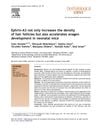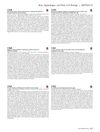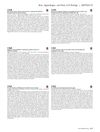 98 citations,
October 2012 in “Dermatologic Clinics”
98 citations,
October 2012 in “Dermatologic Clinics” Eating the right nutrients can improve hair health, but taking extra supplements usually doesn't help unless you have a deficiency.
5 citations,
February 2022 in “Animals” Sodium sulfide slows wound healing, while electric shaving is the safest for preoperative hair removal.
April 2023 in “Dermatologica Sinica” The Pemphigus Disease Area Index and Autoimmune Bullous Skin Disorder Intensity Score are the best tools for assessing pemphigus severity.
 May 2023 in “Journal of contemporary medicine”
May 2023 in “Journal of contemporary medicine” Using Favipiravir, a COVID-19 treatment drug, likely doesn't cause hair loss.
 17 citations,
November 2012 in “Maturitas”
17 citations,
November 2012 in “Maturitas” The conclusion is that proper evaluation and treatment of hair loss in midlife women is important, considering the emotional impact and potential for various treatments.
 21 citations,
November 2017 in “Archives of Dermatological Research”
21 citations,
November 2017 in “Archives of Dermatological Research” Higher enzyme levels found in women with hair loss, suggesting hormone imbalance.
 8 citations,
December 2018 in “Journal of Dermatological Treatment”
8 citations,
December 2018 in “Journal of Dermatological Treatment” The PRP-like cosmetic with biomimetic peptides is potentially effective and safe for treating alopecia areata.
 10 citations,
February 2011 in “Journal der Deutschen Dermatologischen Gesellschaft”
10 citations,
February 2011 in “Journal der Deutschen Dermatologischen Gesellschaft” The document concludes that proper diagnosis and evidence-based treatments are crucial for managing hair diseases, and psychological support for patients is important.
 2 citations,
July 2018 in “Elsevier eBooks”
2 citations,
July 2018 in “Elsevier eBooks” Some supplements may help with hair loss, but there's not enough strong evidence to recommend them without doctor advice.
 15 citations,
July 2008 in “Journal of Dermatological Science”
15 citations,
July 2008 in “Journal of Dermatological Science” Ephrin-A3 helps increase and speed up hair growth in baby mice.
 September 2023 in “Biomedical Optics Express”
September 2023 in “Biomedical Optics Express” New imaging techniques show testosterone delays hair growth and shrinks follicles in mice, but have limited depth for viewing.
 3 citations,
January 2021 in “Applied sciences”
3 citations,
January 2021 in “Applied sciences” Fermented red ginseng and a traditional herb mix improved hair growth in mice.
 151 citations,
February 2007 in “International Journal of Dermatology”
151 citations,
February 2007 in “International Journal of Dermatology” Alopecia areata causes hair loss, has no cure, and various treatments exist.
 May 2023 in “International journal of pharmaceutical sciences and medicine”
May 2023 in “International journal of pharmaceutical sciences and medicine” Sunflower oil was found to promote hair growth in mice with hormone-induced hair loss.
 April 2018 in “Journal of Investigative Dermatology”
April 2018 in “Journal of Investigative Dermatology” Researchers found that the Leptin receptor is a consistent marker for hair follicle dermal cells, which may help future hair research.
 April 2018 in “Journal of Investigative Dermatology”
April 2018 in “Journal of Investigative Dermatology” Fgf20 is important for the development and regulation of the cells that form the base of hair follicles.
 November 2023 in “International journal of biology, pharmacy and allied sciences”
November 2023 in “International journal of biology, pharmacy and allied sciences” Herbal treatments can help with hair problems, but more research is needed.
26 citations,
May 2016 in “Journal of biological chemistry/The Journal of biological chemistry” sPLA2-IIE is crucial for normal hair follicle structure and skin health.
 29 citations,
February 2017 in “International Journal of Women's Dermatology”
29 citations,
February 2017 in “International Journal of Women's Dermatology” Women with excessive male-pattern hair growth should get a full hormone check-up to find and treat any underlying issues, considering both medical and emotional aspects.
 3 citations,
May 2019 in “Journal of Cosmetic Dermatology”
3 citations,
May 2019 in “Journal of Cosmetic Dermatology” Miliacin with polar lipids helps hair growth and improves hair loss in women.
 March 2023 in “International Journal of Biomedicine”
March 2023 in “International Journal of Biomedicine” Hair loss from Telogen Effluvium can be managed by treating the underlying cause and may improve with treatments like minoxidil.
 47 citations,
December 2020 in “Journal of the European Academy of Dermatology and Venereology”
47 citations,
December 2020 in “Journal of the European Academy of Dermatology and Venereology” The document concludes that understanding and treating hair loss requires recognizing its various types and using appropriate diagnostic tools and treatments.
 13 citations,
May 2017 in “Dermatologica Sinica”
13 citations,
May 2017 in “Dermatologica Sinica” Dengue fever can cause a temporary type of hair loss called telogen effluvium.
 3 citations,
January 2016 in “US endocrinology”
3 citations,
January 2016 in “US endocrinology” Alopecia is not a significant predictor of thyroid disease when age and sex are considered.
December 2023 in “Pharmaceutics” The new adhesive nanoparticles are effective for delivering Minoxidil to the scalp without skin irritation.
June 2024 in “Regenerative Therapy” iPSCs show promise for hair regeneration but need more research to improve reliability and effectiveness.
Whale oil significantly promotes hair growth and may be a safe, effective alternative to minoxidil.
 April 2012 in “Informa Healthcare eBooks”
April 2012 in “Informa Healthcare eBooks” Telogen effluvium is a common hair loss condition where many hairs enter the resting phase, often not noticeable until significant loss occurs, and treatment focuses on the underlying cause.
3 citations,
September 2021 in “EClinicalMedicine” ALRV5XR effectively increases hair density in men with androgenetic alopecia without adverse effects.
 67 citations,
November 2002 in “Journal of The American Academy of Dermatology”
67 citations,
November 2002 in “Journal of The American Academy of Dermatology” The document concludes that careful evaluation is key to diagnose and treat women with hair loss, with tests for thyroid, iron, and hormones as needed.























